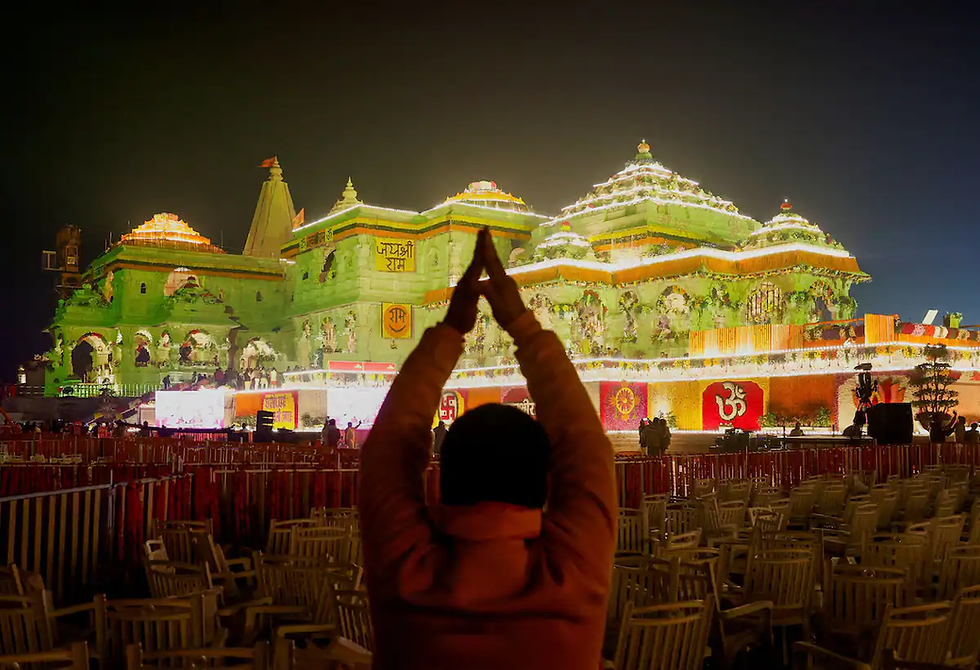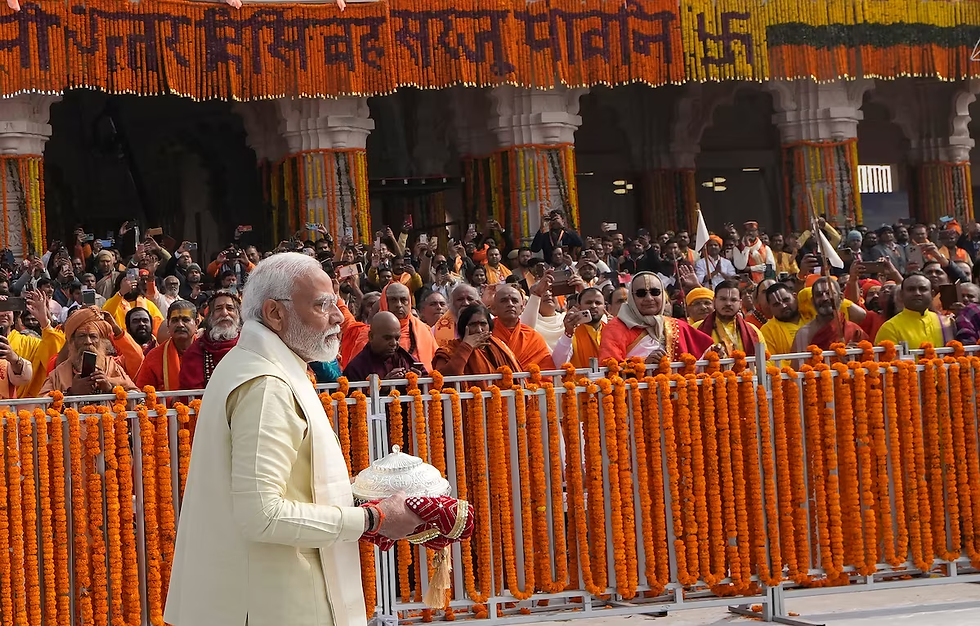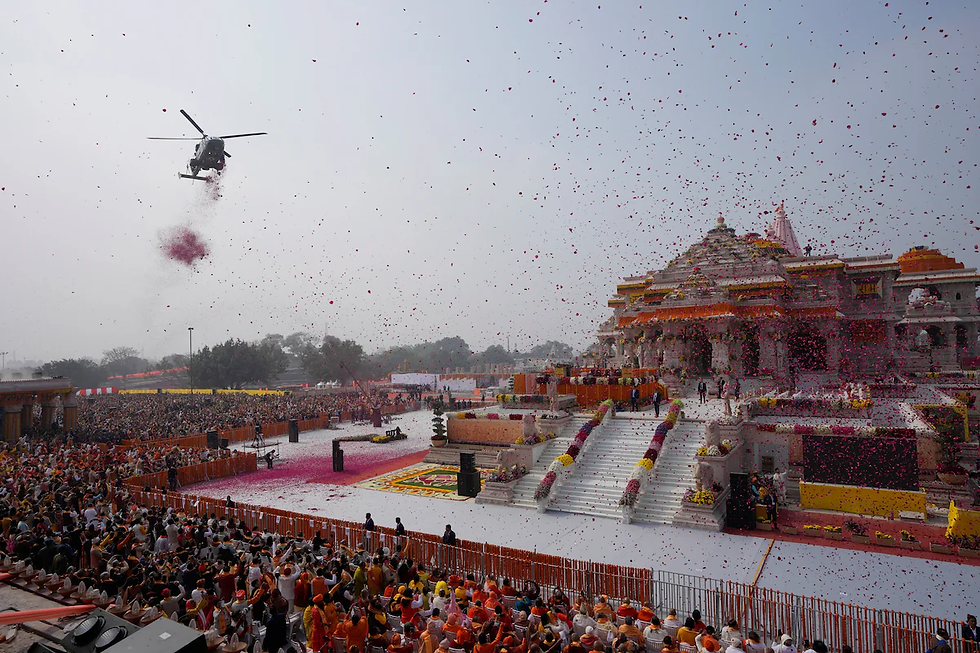A Hindu devotee prays Monday near the Lord Ram temple in Ayodhya, India, after its consecration. (Adnan Abidi/Reuters)
NEW DELHI — In north India, Hindu nationalists clambered atop a mosque to plant the Hindu saffron flag. They did the same in central India, unfurling the standard of Lord Ram atop a Christian church. In the south, they burned down a Muslim fruit seller’s shop. And outside Mumbai’s financial capital, they pressured local police to bulldoze Muslim businesses.
In the past week, a spate of attacks by triumphant Hindu nationalist mobs against minorities, chiefly Muslims, has raised fears across India of religious tensions flaring following Prime Minister Narendra Modi’s consecration of a temple in Ayodhya that was seen in some quarters as a symbol of Hindu vengeance against India’s centuries-long oppression by Muslims.
Modi’s party has pushed for a more explicitly Hindu vision of India’s identity in contrast to the post-independence leaders who saw the country more as a secular, multicultural democracy.
From northern Uttar Pradesh to southern Telangana, each of the attacks in at least six Indian states followed a near-identical pattern: They erupted after men on motorcycles and jeeps waved Hindu nationalist saffron flags, blared loud devotional music from speakers and chanted the slogan “Jai Shri Ram,” or victory to Lord Ram, as they drove through Muslim neighborhoods.
In each case, the violence either immediately preceded or followed the religious ceremony presided by Modi himself on Monday. In a soaring address from the temple premises, the prime minister, a staunch Hindu nationalist, congratulated citizens for successfully “untangling a historical knot” and building a “brighter future.”
The 71-acre temple complex is built at the site of the demolished Babri mosque that Hindu nationalists say was itself built on top of a razed Hindu temple in the 16th century and served as a reminder of Muslim domination over the majority Hindu subcontinent as long as it stood.
Indian Prime Minister Narendra Modi arrives for the dedication of the Lord Ram temple. (Rajesh Kumar Singh/AP)
The mob attacks in the last four days have raised uneasy parallels to December 1992, when a Hindu mob agitating for the Ram temple in Ayodhya tore the Babri mosque down, sparking nationwide religious riots that killed more than 2,000 people, mostly Muslims. Mumbai was particularly hit hard by rioting, and months later, the Muslim mafia boss Dawood Ibrahim carried out revenge attacks that killed hundreds in early 1993.
Irfan Engineer, director of the Mumbai-based Center for Study of Society and Secularism, a nonprofit founded after the violence of 1993 to study riot-affected areas and propagate peaceful coexistence, compared the Hindu nationalist processions in Muslim neighborhoods to wartime marches performed by occupying militaries “for establishing control.”
“Muslims are slowly accepting that they must gulp down every insult because even the mildest reaction will invite trouble from the state,” he said.
In visuals circulating widely on social media in recent days, saffron-flag-wielding mobs have been seen pelting shops selling meat with stones or clothing stores with apparently Muslim business names. The provocative marches through Muslim neighborhoods have prompted Modi’s critics to caution against growing Hindu triumphalism under his watch.
The worst of the clashes took place in a suburban neighborhood north of Mumbai called Naya Nagar. The conflict started the evening before Monday’s temple consecration ceremony, when a Hindu motorcycle procession was stopped with barricades put up by Muslim residents.
The situation escalated when Nitesh Rane, a lawmaker from the ruling Hindu nationalist Bharatiya Janata Party, demanded that the barricades be removed and threatened to “find and kill” those who blocked the Hindu processions.
Muslim residents then threw stones at another procession that passed through their neighborhood the next day.
Rane blamed the clashes on Muslim refugees from Myanmar and Bangladesh and called in government bulldozers as punishment. “Naya Nagar is not the new Pakistan,” he told reporters on Tuesday at a news conference. “We know very well what needs to be done there and how many bulldozers are needed.”
Rane could not be reached for comment.
An Indian air force helicopter drops flower petals on the site of the temple on the day of its consecration. (Rajesh Kumar Singh/AP)
Bulldozers then came through and destroyed illegally built structures belonging to 55 shopkeepers in Naya Nagar and another Muslim-majority neighborhood. As of Thursday, an uncertain peace has prevailed with 13 arrests, mostly of Muslims, according to local officials.
Tariq Chaudhary, a Muslim student, was driving his father’s truck around 8 p.m. on Tuesday near Mumbai when a mob of more than 200 young men charged at him armed with iron rods and wooden sticks and shouting, “Hail, Lord Ram.” They smashed the truck’s windshield, dragged him out and rained blows and kicks on him before moving on to another vehicle. Tariq suffered numerous cuts and bruises on his face, hands and back. His co-worker suffered a head injury and received four stitches at a local clinic.
“In Ayodhya, they said Lord Ram belongs to us all,” Chaudhary said by telephone. “Does Lord Ram teach them to drag Muslims out, beat them with sticks and force them to say, “Hail, Lord Ram”?
Even though reports in local media have trickled in this week of clashes in small towns and on college campuses, police have rarely made arrests or filed cases against Hindus and often punished Muslims or dissidents instead. One exception was in BJP-ruled Uttar Pradesh state, where police arrested three men for replacing a green Islamic flag on top of a mosque with a saffron banner.
On several campuses, heated debates have erupted over the temple inauguration, and in two cities, students were beaten or harassed when they tried to organize screenings of “Ram ke Naam,” or “In the Name of God,” a 1992 documentary film that delves into the controversial history behind the Hindu nationalist campaign to build the temple in Ayodhya.
After students at a film school in Pune promoted the documentary screening, a group of more than 20 men barged onto campus on Tuesday, scuffled with students and set their posters aflame.
The police briefly detained six of those involved before releasing them. On Wednesday, they filed a complaint against six of the organizers of the screening for “outraging religious feelings” and acting against “national integration.”
By Anant Gupta
Anant Gupta is a researcher with the India bureau of the Washington Post. He is based in New Delhi.Twitter
washingtonpost.com © 1996-2024 The Washington Post



